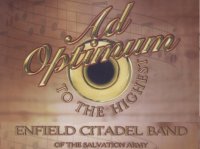Annual Pre-Contest Festival
11-Nov-2009Enfield Citadel Band & Bones Apart
Conductor: Jonathan Corry
St Johns Smith Square
Friday 16th October
 Enfield Citadel Band’s 63rd consecutive contest weekend event opened in sparkling form with the march “Praise” (Wilfrid Heaton).
Enfield Citadel Band’s 63rd consecutive contest weekend event opened in sparkling form with the march “Praise” (Wilfrid Heaton).
The band produced a well-drilled rendition, with clean tonguing and cutting accents, making much of the dynamic contrast. They then went straight into “They shall come from the east” (Larsson arr Steadman-Allen), a fitting choice in the light of the presence of so many visitors from overseas, notably Norway (visited by the band earlier in the year) and the USA.
Classical Enfield
Following prayer and introductions, Wilfred Pyper, the Songster Leader from Belfast Temple, stepped into the role of compère, introducing Keith Wilkinson’s arrangement of the overture “Beatrice and Benedict” (Berlioz).
Delicate and precise playing in the opening bars led up to a blaze of sound when the full band entered. There was fine solo work on euphonium and cornet (shared amongst the section) and cornet and horn tremolos were effective, although there was uncertainty in some of the exchanges in the central section.
The cornets as a whole kept were very busy, topped off with some sparkling work by Tim Buckle on soprano.
Spanish flair
The guests for this year’s concert were the four ladies comprising the trombone quartet Bones Apart (Helen Vollam, Becky Smith, Jayne Murrill and Lorna MacDonald).
They commenced their first set with three movements from “Carmen” (Bizet arr Vollam), astounding the audience with their trills and double-tonguing, whilst the constantly moving bass part made one wonder how Lorna kept going. The second movement was nicely under-stated, with subtle shadings and variations of colour, whilst the closing “Habanera” put Lorna once more in the spotlight as she established and maintained the rhythmic underpinning of the piece.
Ray Farr strikes again
Ray Farr’s rock style arrangement of Bach’s “Toccata” has become very popular in recent years, Ray, a former member of the Tottenham Citadel Band, had arranged the accompanying “Fugue in D minor” especially for Enfield.
It certainly put the various sections of the band through their paces, but seemed a little static and lacking in variety, without the immediate impact of the earlier piece.
A touch of Gershwin
Bones Apart then returned with “Three Preludes” (Gershwin arr Challis). Although originally written for piano, Lorna’s arrangement works particularly well, with some nifty slide work in the opening “Allegro” and beautifully sustained, quiet playing in the central “Blue Lullaby”, with a solo for Lorna herself.
The third movement, “Spanish Prelude”, opened vigorously with a lively melodic line, contrasting with a quiet central section.
Eric Ball classic
Jonathan Corry, conducting his second Pre-Contest festival with the band, chose to close the first half with Eric Ball’s “Resurgam”. Written for the 1950 British Open contest, it has become a staple item in the repertoire of both contesting and Salvation Army bands, still presenting considerable challenges both for individuals and for the band as a whole.
From the sonorous opening tones of the basses and euphoniums, it was a commanding reading, with excellent contributions from Ralph Brill on cornet and Paul Baker on euphonium. The intensity was well developed, the “Dies Irae” suitably menacing and the reference to his earlier tone poem “Exodus” in the bass was appropriately forceful, whilst the shot notes were played with confidence and assurance.
The reprise of the opening was quite magical, the hall so quiet that the very intake of breath could be heard, and Jonathan held a long pause on the final chord to good effect.
Following Neil Hefti’s “Cute”, played to encourage the audience to return to their seats, the second half commenced with Eric Ball’s march “Torchbearers”, taken slightly faster than the ISB earlier in the day, but with due attention to detail, nicely pointed dotted rhythms in the horn section, and a strong “Out there” motif from the basses and bass trombone.
 Transatlantic contrasts
Transatlantic contrasts
Bones Apart presented two contrasting numbers, starting with John Challis’s arrangement of “My Funny Valentine” (Rodgers), which featured Helen Vollam as soloist.
Starting on her own, the other instruments gradually joined in, the texture generally quite sparse, with gentle arpeggio figures complementing the soloist, who demonstrated admirable control and flexibility. “The Stars and Stripes Forever” (Sousa arr Simon Willis) has become something of a signature piece for Bones Apart and they produced a barn-storming performance, complete with “piccolo” solo, taken even faster the second time through.
Moments of uncertainty
“The Overture to The Magic Flute” (Mozart arr Kenyon) was the second item on the programme that is also on Enfield’s latest cd recording, launched that day.
The opening was taken more slowly than usual, with the chords carefully placed, whilst the quiet dynamics in the fast section were well controlled. The solo entries were slipped in neatly without any loss of tempo, although there were a few dodgy moments at one point when someone in the bottom half of the band seemed to get adrift.
Premiere for trombones and band
Belfast-born Dorothy Gates is currently Principal Trombone in the New York Staff Band and with several compositions to her name was perhaps an obviously choice to be invited to write something to feature Bones Apart with the band. “Soul Origin” was the outcome, drawing inspiration from a text in Corinthians stating “For we were all baptised by one spirit into one body”.
After an atmospheric opening featuring the percussion section together with whispered text from the band the trombones entered, playing at first as individuals and then as a group, with a lively central Bossa Nova section. One passage with the soprano soaring above the trombones was particularly effective.
Introducing their encore, “I will follow him” (arr Richards), the audience was greeted with the unlikely sight of the Enfield trombone section, not required for the previous item, appearing on the platform dress in nuns’ costumes! They then presented the item as a double quartet, at times alternating and at times joining together and making a magnificent sound.
Philip Wilby in reflective mood
Philip Wilby has produced much music full of intricacy and complexity, but “Wondrous cross” is a straightforward reworking of a vocal setting of “When I survey the wondrous cross” that he had presented to The Salvation Army. Maurice Patterson’s solo playing showed great sensitivity, and the music went on to develop something of a Celtic feel, rising to an intense climax and with some effective divisi writing for the bass section.
Sparkling finale
The final programmed item was Peter Graham’s “Shine as the light”, with a lively sense of rhythm throughout the band, and the two-man percussion section being kept extremely busy.
The interplay between cornet and soprano was deftly handled, and there was clearly a good rapport between Ralph Brill and Paul Baker, whilst the final presentation of “The light has come” made for an exhilarating and positive finish.
The evening ended with Enfield’s traditional presentation of the march “Red Shield”, with each featured section rising to their feet in turn.
Whilst the band is clearly still undergoing a period of transition, with a few recent personnel changes, they performed well, and the prospects for the future under Jonathan Corry’s leadership look promising.
Peter Bale









